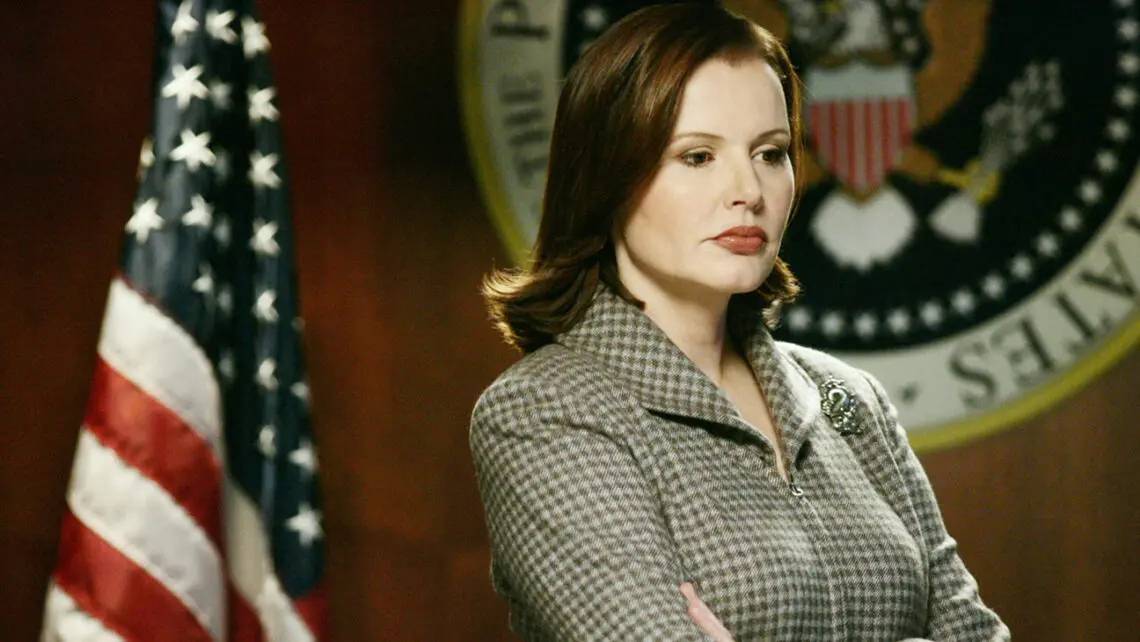Revisiting ‘Commander in Chief’: A Reflection on Fiction and Reality
A parallel between fiction and real-life politics
An aging President struggles with health issues, leading to his younger, female Vice President stepping up. This storyline seems ripped from today’s headlines, where Vice President Kamala Harris became the 2024 Democratic nominee due to President Joe Biden’s health concerns. However, it echoes a plot from nearly two decades ago.
In 2005, the series Commander in Chief debuted, featuring Geena Davis as the first female Vice President in American history. Her character, Mackenzie Allen, was chosen to balance an older male candidate’s ticket. The show depicted Allen’s sudden ascent to the presidency after the death of fictional President Teddy Bridges, highlighting themes that resonate even more today.
Fiction vs. reality: Notable differences
Despite the similarities, there are key distinctions between Commander in Chief‘s political fiction and today’s political landscape. For starters, in the series, President Bridges is a Republican, while Davis’s Mackenzie is an Independent. The show initially captivated audiences, even outperforming House in ratings. However, it lost momentum and was canceled after just one season, sparking a dialogue about America’s readiness for a female president, even in fiction.
Behind the scenes: Insights and reflections
Series creator Rod Lurie firmly believes Commander in Chief played a significant role in preparing America for the possibility of a female president. He reminisces about his conversations with network executives, emphasizing the show’s potential impact on societal norms and perceptions. Similarly, Davis hoped her portrayal would normalize the idea of a woman president for viewers.
Anne Sweeney, former president of ABC Television Group, lauded the show’s significance. During its 2005 premiere, women held fewer positions of influence in government compared to today. The show arrived at a time when representation in media could shape public opinion and expectations.
Pop culture’s role in societal change
The influence of pop culture on societal norms is well-documented. Shows like Will & Grace and figures like Ellen DeGeneres have played pivotal roles in transforming public perceptions of marginalized groups. A poll conducted a year after Commander in Chief premiered revealed that 58 percent of Americans familiar with the show were more likely to take a female presidential candidate seriously.
Despite its groundbreaking narrative, Commander in Chief faced internal struggles. Lurie was replaced due to script delays, and his successor, Stephen Bochco, shifted the show’s tone, which led to its demise. Davis wistfully acknowledges the lost potential of the series had it continued under her initial leadership.
The legacy of ‘Commander in Chief’
Melissa Silverstein, Artistic Director of the Athena Film Festival, underscores the show’s impact. During the Commander in Chief era, she worked to open pathways for America to elect its first female president. Silverstein believes the series helped pave the way for more diverse female candidates, despite societal critiques focused on superficial aspects of their lives.
Lurie and Davis were mindful of these gender biases while crafting President Allen’s character. They balanced portraying her femininity without succumbing to unfair double standards.
Surprisingly, few in the media have reached out to Lurie about Commander in Chief, though interest remains high in his film The Contender. This 2000 film follows a female senator’s tumultuous journey to becoming Vice President amidst a scandal, reflecting another facet of women’s political struggles.
The journey toward gender equality
As Harris navigates her political career, echoes of the past challenges faced by female politicians linger. Lurie notes that derogatory comments about Harris’s personal life mirror the critiques faced by fictional and real female leaders. Nevertheless, these criticisms are less impactful today, indicating progress since the days of The Contender and Commander in Chief. Lurie’s projects, influenced by his daughter’s feminist perspective, focus on creating empowered, complex female characters.
Geena Davis not only portrayed a fictional president but became a real-life advocate for gender equity. She founded the Geena Davis Institute, driven by her observations of gender imbalances in children’s media. The institute’s research highlights ongoing disparities, such as the over-sexualization of powerful female characters compared to their male counterparts.
Davis holds that gender inequality in entertainment can be swiftly corrected. She advocates for immediate gender balance in films, TV shows, ads, and video games, envisioning a world where women account for half of the characters and storyline significance.
While Davis refrains from commenting on the 2024 election, Sweeney emphasizes the importance of representation. She hopes to see a woman president become a reality, transcending the boundaries of fiction.
Engage with these reflections and share your thoughts on social media. Follow us for more insightful articles and updates on the intersection of pop culture and political progress.

 Italian
Italian







